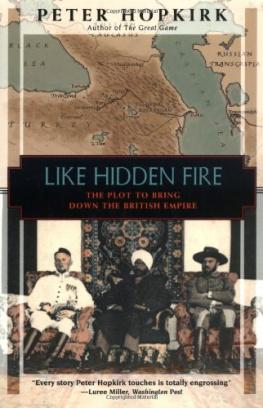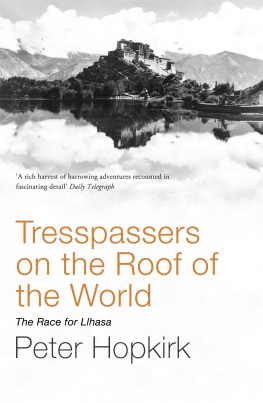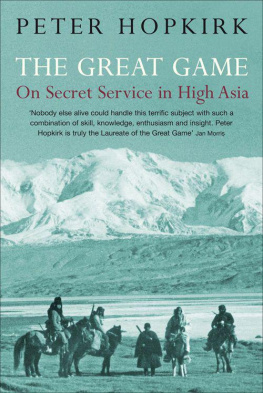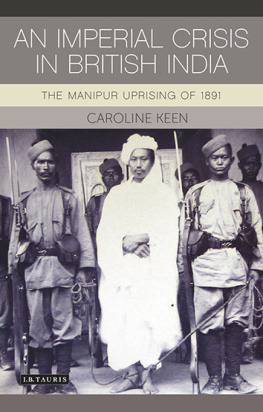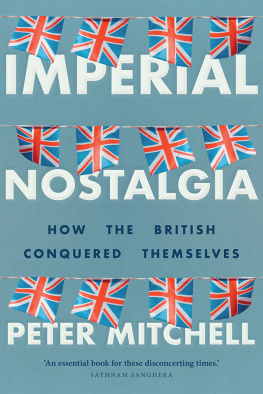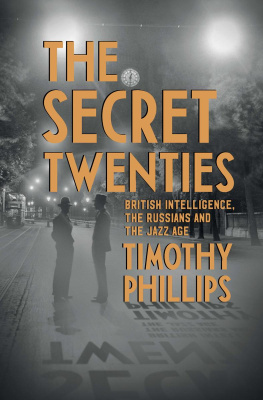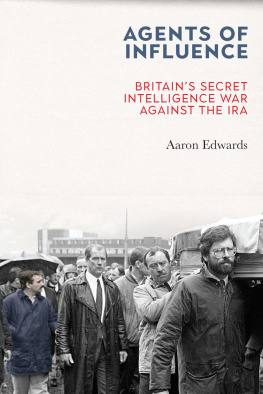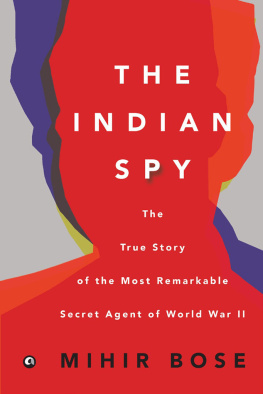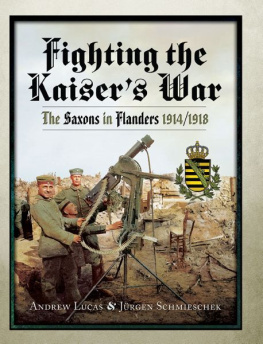Acknowledgements
My principal debt, as with my previous narratives of imperial rivalry in Central Asia, is to those individuals, on either side, who left first-hand accounts of these turbulent events. For without them this book could never have been written. They include Ambassador Henry Morgenthau, Captain Oskar von Niedermayer, Captain Werner Otto von Hentig, Har Dayal, Raja Mahendra Pratap, Sir Frederick OConnor, Captain Edward Noel, Major Ranald MacDonell, Captain Reginald Teague-Jones, General Sir Wilfrid Malleson, General Lionel Dunsterville, Sir Percy Sykes, and Morgan Philips Price of the Manchester Guardian. All are now dead. Their accounts of the war east of Constantinople are to be found in my bibliography.
Living individuals to whom I owe a considerable debt include Brian Pearce, a Russian scholar and historian, who generously placed at my disposal the material he has gathered, over many years, on the strange affair of the twenty-six Baku commissars and the alleged role of Captain Teague-Jones in their murder. Also Air Commodore A. R. D. MacDonell, CB, DFC, for the portrait of his father, Ranald MacDonell, and for other information on him, and Christian Dewar Durie, for allowing me to read and quote from her grandmothers graphic account of Baku during the Muslim massacres of 1918. Again I am most grateful to Tanya Rose, daughter of M. Philips Price the war correspondent, for information about her father, and to Peter Ellis of Toronto for information about his father, Colonel C. H. Ellis, and for photographs taken by him.
I also have to thank Dr H. W. von Hentig for material, including photographs belonging to his late father, Werner Otto von Hentig, and for most interesting discussions with him about the latters role in the German mission to Kabul. Mr Paul Bucherer-Dietschi, head of the Stiftung Bibliotheca Afghanica, in Switzerland, kindly clarified important points arising over the missions leadership. I am most grateful, too, to Angelica Kyang for translating Captain Niedermayers account of the mission from the German for me, and to Fahad Diba for drawing my attention to material which he came across while compiling the monumental bibliography of Persian history on which he is working.
As a narrative historian, I have found the works of certain specialist historians of this period extremely useful. They include Fritz Fischer, Ulrich Gehrke, Renate Vogel, Frank Weber, Ulrich Trumpener, George Antonius, Firuz Kazem-zadeh, Ronald Suny, William Olson, Bradford Martin, Ludwig Adamec, and Brigadier-General F. J. Moberly, the official British war historian of the Mesopotamian and Persian theatres. Their works are listed in my bibliography.
In view of her interest in Central Asian history and her training as a historian, I am once again fortunate in having Gail Pirkis, formerly of OUP Hong Kong, as my editor. As always, I am much indebted to my wife Kath, herself now the author of a book on Central Asia, for reading every word of my narrative and for making invaluable criticisms and suggestions. She also very kindly prepared the index, as well as the draft maps from which the cartographer, Denys Baker, produced the finished versions - as he has for my previous four books.
1
A Place in the Sun
Had one been travelling through eastern Turkey in the spring of 1838, one might have been startled to come upon a young Prussian officer perched on a remote hillside carefully sketching an Ottoman fortress. However for Captain Helmuth von Moltke, who was destined to become one of Germanys greatest soldiers, this was no sketching holiday. He was there, on the upper reaches of the Tigris, on strictly professional business. Three years earlier he had been seconded to the Sultans court as a military adviser, entrusted with the task of helping the Turks to modernise their army along the latest Prussian lines. He had soon found, though, that his advice was being ignored, and had therefore turned his mind to broader considerations. During his many months of travelling through the Sultans far-flung domains, sketching, surveying and note-taking, the young Moltke had become convinced that the Ottoman Empire was in terminal decline. So corrupt and resistant to reform was it that its eventual collapse was inevitable, leading to a free-for-all among the other powers for the choicest pieces.
Moltke was not the first to have reached this conclusion, for the fate of the Ottoman Empire, the so-called Eastern Question, was already preoccupying European statesmen. But the future Field Marshal, whose military prowess Bismarck would be quick to recognise and harness, was convinced that he had the answer. On his return to Berlin in 1839 from the Sultans service, he urged his superiors to look closely at Turkey. It was, he argued, ripe for German penetration. It could be linked, both economically and militarily, to Berlin by a railway running through the Balkans, making it the shortest and fastest route to the East, and bypassing the British-controlled sea lanes. In addition, he singled out two areas the fertile strip between the Tigris. and the Euphrates in Mesopotamia, and Palestine - as ideal for his energetic fellow Germans to colonise and transform for future generations. Here, he argued, was Germanys place in the sun. But time was short. Already, he warned, the other European powers were beginning to hover like vultures over the Sultans disintegrating empire, while his own country was nowhere to be seen.
Moltke was not alone, however, in seeing a future for German emigrants in the moribund Ottoman domains. In 1846, the political economist Friedrich List wrote that the lower reaches of the Danube, the western shores of the Black Sea and the northern half of Turkey offer German colonists an abundance of unoccupied and naturally fertile land. He, like Moltke, called for the building of a railway which would run from Berlin to Baghdad. All this, he argued, could be achieved through peaceful penetration, and would be part of a larger, world-wide Teutonic expansion, spearheaded by explorers, doctors, diplomats and businessmen. Lists views on Teutonic expansionism were later to earn him the title of the first German imperialist. Another, with somewhat similar views, was Professor Wilhelm Roscher of Leipzig University, who argued that when the Sultans empire was eventually dismembered the German people should see to it that, as their rightful share of the spoils, they acquired Asiatic Turkey.
The expansionist movement was now gathering pace among intellectuals and academics, with Paul Lagarde, Professor of Oriental Languages at Gottingen, adding his voice to those of Moltke, List and Roscher. Lagarde, the father of the chauvinistic Pan-German movement, contended that it was the historic destiny of the German-speaking peoples to extend their frontiers eastwards. Certain races, he claimed, had become degenerate and a burden on history. They included the Turks, the Jews and the Magyars. They could, though, serve as the mortar for a nobler race - mean ing, of course, the Germans. Because they know that our life is their death, he went on, they hate and fear us. Lagarde too saw the Balkans and Asiatic Turkey as ideal for colonisation and economic exploitation.
At that time, of course, such ideas were little more than dreams. For Europes German-speaking peoples were then still divided, spread through a host of small kingdoms, principalities and independent cities. First this Teutonic jigsaw had to be fitted together to form a unified Germany. It was not until 1871, following successful wars against Denmark, Austria and France, that this was finally achieved - thanks to the vision of Bismarck, and the military genius of Moltke, who by this time commanded the Prussian army. A new nation, largely under Prussian leadership and overflowing with youthful dynamism and ambition, now existed in Europe. It was to prove an uncomfortable bedfellow.

